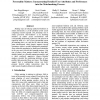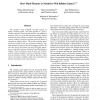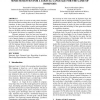168 search results - page 19 / 34 » Matching as a non-cooperative game |
HICSS
2007
IEEE
15 years 8 months ago
2007
IEEE
Finding ways of reducing undesired behavior in online interactions is at the forefront of the social computing research agenda. One promising way to reduce perceived “bad behavi...
106
click to vote
LICS
1997
IEEE
15 years 5 months ago
1997
IEEE
We consider a class of infinite two-player games on finitely coloured graphs. Our main question is: given a winning condition, what is the inherent blow-up (additional memory) of ...
107
click to vote
IJCAI
2007
15 years 3 months ago
2007
This paper is a comparative study of game-theoretic solution concepts in strictly competitive multiagent scenarios, as commonly encountered in the context of parlor games, competi...
144
Voted
AIA
2006
15 years 3 months ago
2006
Epistemic logic allows to reason not only about situations, but also about the knowledge that a set of agents have about situations. In later years, epistemic logic has been appli...
JCIT
2010
14 years 8 months ago
2010
This work discusses clearing policy used by a specialist agent on marketing strategies under the rules of TAC CAT agents International Tournament. The goal of this agent is to cre...



